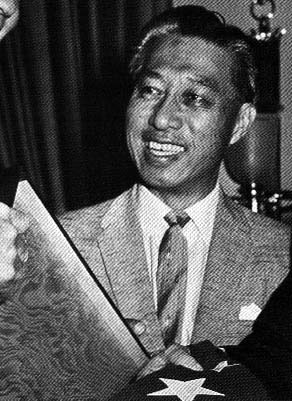

Interview with
Hiram Fong
Former U.S. Senator of Hawaii
March 9, 1997 in Kahalu'u, Hawaii
Conducted by Tiffany Nozawa
Senior at Kahuku High
![]()
Q: Where were you stationed and what were the living conditions during World War II?
A: In May of 1942 I was called to service to Hickam field. I was ranked as lst Lieutenant in the army reserve. I was one of nine Chinese boys assigned to judge advocates in a law office. The conditions were very nice. All the beef was used by the army. If you knew the colonel or captain, you could ear filet mignon. We had all the meat and white crabs we wanted.
![]()
Q: As a member of the U.S. Army Air Corps, what was your experience in battle?
A: I never went abroad and fought in the front lines. I was assigned to Iwo Jima in the 7th Fighter command, but I got elected to office and was released.
![]()
Q: What do you feel is the most memorable aspect of WWII?
A: would've come in and taken over the islands. We defeated them and that set them back.
![]()
Q: What do you think is the most unknown entity of the war to the average civilian?
A: I suppose the suffering of our boys out in the Pacific. Also how difficult it was for them to get into the islands because they were so fortified by the Japanese. There was a tremendous toil in Okinawa, Iwo Jima, and many other places.
![]()
Q: If you could go back and change one things that happened during the war, what would it be?
A: That we wouldn't have fought at all. Because there is no reason to fight! You find out after every war that war is useless. We spent a lot of money and America really went broke. That is the reason why we have such a big deficit. We spent so much money. You know it costs so much to drop a bomb, so much to have people in service, and there are so many things you have to do to fight a war. We could have saved all that and used it for humanity. Look now we're friends again. It doesn't make sense.
![]()
Q: Do you feel that the bombing of Pearl Harbor was a surprise attack or do you think that the U.S. military knew of Japan's intentions?
A: Yes, well they were anticipating that something would happen, because the U.S. had done diplomatic actions that really hurt Japan and the people of Asia. They passed the Immigration Acts, for example, and other things that were discriminatory.
![]()
Q: Where were you when you heard of the bombing of Pearl Harbor? What was your first reaction?
A: I was home, it was Sunday morning and I was up at Alewa Heights and I came out to look for my newspaper and then I heard a wizzling sound. I didn't know what it was and when I went into the house to turn on the radio they said that Pearl Harbor was bombed. And I listened to the radio and nobody has ever said that they heard this radio announcement, that the Japanese had landed at Waianae and were approaching Honolulu. I heard them distinctly over the radio. Funny, but I never heard anyone say that they heard that. That was scary.
![]()
Q: What kind of mind frame do you have to live by to be a mentally stable soldier?
A: Well when you are out in the army you are supposed to fight right and whether you like it or not in the front line, you do your best. But I never experienced that, I was always behind a desk.
![]()
Q: Do you feel that it was necessary that America got involved in the war?
A: No, it was not necessary and it could've been prevented.
![]()
Q: How did the war experience affect your actions as Senator?
A: Well we did everything possible to try to end it. There was so much antagonism and resentment against the war. There was so many draft dodgers and mothers against the war.
![]()
Q: How did the internment camps affect you and the people close to you?
A: The internment was not necessary but I suppose that the government was quite worried. They never had a situation like that and there is a big concentration of Japanese here and in California and they thought that they would try sabotage. So they did what they thought to be for security. But actually they didn't do that to the Germans or Italians, which we fought in WWI and WWII. They doubted their American citizenship and loyalty, but the Japanese Americans proved them wrong.
![]()
Q: What was your most unexpected experience within the entire war scene?
A: I didn't have any except that I was a practicing attorney and the courts were all closed and we were wondering how we were going to make a living. All the attorneys were told that the courts were closed and the military had taken over and everything was under martial law. That was very difficult. Later on the courts were opened up but still everything was quite limited.
![]()
Q: What was the most emotional experience of WWII?
A: Throughout the war we had a feeling of depression and we always felt uneasy and melancholy. You were not happy because of this overwhelming feeling of war and tragedy all around. So as soon as the war ended everything was lifted and you could be free again.
![]()
Web page created by Alana Salom, student of The Learning Community